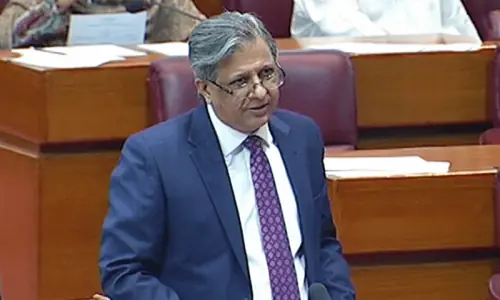THE sharp tone and unusual specificity of the remarks made by the Financial Action Task Force about Pakistan after the Paris meetings should be taken seriously by the government. Much of the language in the press release following the meetings is routine — listing the 10 areas in which outcomes are required, as well as pointing to the specific risks that Pakistan’s financial system faces. But in significant measures, there is new language in the public remarks that points towards a hardening of the stance taken by the global watchdog. In one place, for example, the remarks say that Pakistan “does not demonstrate a proper understanding of the TF [terror financing] risks posed by Da’esh, AQ, JuD, FiF, LeT, JeM, HQN and persons affiliated with the Taliban”. This is a striking sentence because it goes far beyond the language of the October 2018 meetings in clearly saying that the country “does not understand” the hazards it is facing, and goes on to make a long list of terrorist entities that present such a terror-financing risk.
The remarks end by pointing out the “limited progress” that has been made thus far, and “urges Pakistan to swiftly complete its action plan, particularly those with timelines of May 2019”. This language takes the message from FATF far beyond what was said in October, and even implies that further action could be taken as early as June if strong material progress is not made on the plan by May. There is little doubt that FATF is ratcheting up the pressure on Pakistan, and the focus is entirely on terror financing. Naming specific groups means action needs to be taken against them, and not of the sort we have seen over the years, which appears to be more cosmetic in nature and easily reversible.
Previous governments have struggled with the question of acting against those entities named by FATF and listed under UN Security Council Resolution 1267 as terrorist entities. Announcing a ban on a group is only the first step; this needs to be followed up with asset seizures and travel bans. This is the point at which genuine compliance can be said to begin. For the moment though, the government is struggling with the very first step of notifying a ban, let alone following it up with concrete steps to separate the leadership of these groups from their operations and assets. In the meantime, the country’s financial system faces further action from FATF, a step that would bring significant costs for the economy at a time when it is already gasping for air. It is surprising that, over the years, hardly any seriousness of purpose has been in evidence when it comes to curtailing the terror-financing risks in Pakistan. But that attitude cannot continue any longer. The time to take forceful action has arrived.
Published in Dawn, February 24th, 2019



























